Bussiness
Five key Colorado Senate races have major business implications | The Sum and Substance
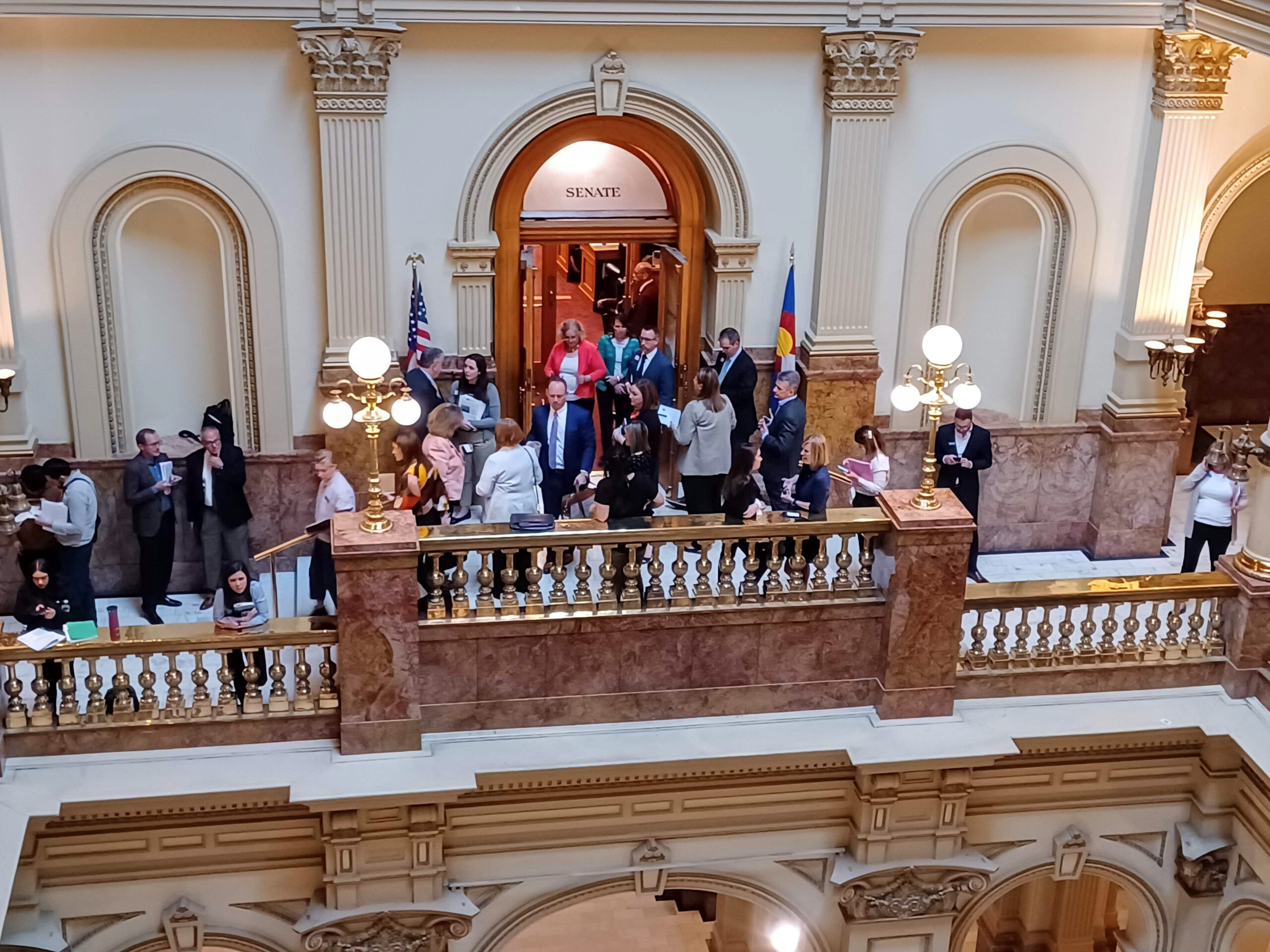
Democrats need to flip just one seat in the Nov. 5 election to ramp their control of the Colorado Senate up from a majority into a supermajority — a fact that is not in dispute.
Where the Democrats and the minority Republicans diverge is in the idea of what exactly that one flipped seat could mean, particularly when it comes to business issues.
Senate President Pro Tem James Coleman, the Denver Democrat expected to succeed term-limited Senate President Steve Fenberg next year in his leadership of the chamber, said in an interview: “I don’t think it will be a lot of differences.” Coleman argued that Democrats will continue to seek bipartisan support on bills, must continue to think first about the needs of their communities and have been talking with Republicans on areas where they can align.
Senate Minority Leader Paul Lundeen, R-Monument, sees it very differently, though. With a hold of 24 seats instead of the 23 they now control, Democrats can override vetoes, put constitutional amendments onto the ballot and change legislative procedures without the support of a single Republican. And they already hold a supermajority in the House, along with having Democrat Jared Polis in the governor’s office meaning there no longer would be any checks on their Capitol power.
For business, Lundeen said, this would largely negate the voice of the party — his — that believes fully in free-market enterprise in favor of a party whose members increasingly support “the wholesale concept that marketplaces are bad, and profits are bad.” But the issue isn’t black and white, as Democratic nominees in key races include an El Paso County state representative who frequently broke from his party on key business votes and a Western Slope businessman who’s vowed to challenge certain regulations.
Colorado state Sen. James Coleman speaks in April in the Senate about his construction-defects reform bill.
“You have a lot of people who can come in not only with business issues but with a willingness to do what’s right for Colorado,” Coleman said. “All that goes to making sure we have good policy.”
Lundeen, however, can cite specific business-opposed policy that might have turned out differently this past session had Senate Democrats had the supermajority. That includes two labor bills — one to force construction contractors to pay wages that subcontractors fail to pay and another to ban mandatory company meetings at which political subjects are discussed — that Polis vetoed and that Democrats couldn’t override.
“The governor does step in mercifully when things go completely off the rails,” Lundeen said, noting that Polis must step down due to term limits after the 2026 election. “It will be a different world when we can’t even rely on Governor Polis to step in when things get out of control.”

Colorado Senate Minority Leader Paul Lundeen and Assistant Minority Leader Bob Gardner speak at a Colorado Chamber of Commerce Technology Alliance meeting.
Business leaders spent much of the 2024 regular session on the defensive, facing proposals to ramp up oil-and-gas regulations, study enactment of a single-payer healthcare system and give more power to labor through the aforementioned bills. But many of those measures stalled or died in the Senate, where moderate Democrats on committees separated by just one vote joined with business leaders and Republicans on crucial tallies.
If Democrats win more seats, it’s likely to mean having fewer or no committees separated by one vote. And while pro-business Democratic moderates like Sens. Kyle Mullica of Federal Heights and Dylan Roberts of Frisco are returning to the chamber, two crucial moderate Dems — Sens. JoAnn Ginal of Fort Collins and Rachel Zenzinger of Arvada — are exiting because of term limits.
One thing on which largely every Capitol observer agrees is that five races — three of which are now held by Republicans but that involve constituencies changed from the last election due to redistricting — will determine the makeup of the Senate in 2025. Thus, Republicans must win at least three of those contests to stave off superminority status.
Those key races are:
Senate District 5 (Glenwood Springs south through Aspen, Gunnison and Montrose)
Republican Sen. Perry Will is vacating this seat to run for the Garfield County Commission. That leaves eight-year GOP Rep. Marc Catlin of Montrose to take on Garfield County small business owner Cole Buerger, a Democrat, in this seat that leans slightly Republican.

Cole Buerger speaks at a Colorado Chamber of Commerce event
Buerger touts his support for business, saying that the transition to lower-emissions energy sources can be done only in realistic and cost-efficient ways and that a key to making housing more affordable is training more Coloradans to work in construction trades to boost supply. He also argues that as a majority-party moderate, he could have more influence on molding business legislation than a typical member of the minority party.
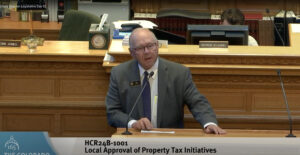
Colorado state Rep. Marc Catlin speaks on the House floor during the 2024 special session.
But Catlin is no typical member of the minority party, backers like Lundeen argue; he’s a water-rights expert who earned the vice chairmanship of the House Agriculture, Water & Natural Resources committee despite being a Republican. He’s opposed numerous bills raising costs on businesses while sponsoring key bipartisan bills, such as a 2019 law to prevent surprise billing of hospital patients who happened to be serviced by an out-of-network provider.
Senate District 6 (San Luis Valley, Four Corners and Durango areas)
Republican Sen. Cleave Simpson of Alamosa, a rancher and water engineer, is seeking re-election in a district that is geographically different than the one he won in 2020, having added more Democratic strongholds like Durango to become a toss-up area. Known as one of the more moderate members of his caucus, he’s fought for issues ranging from affordable broadband to increased funding for behavioral health and is the minority-caucus whip.
Opposing Simpson is Vivian Smotherman, a first-time office seeker whose stated platform takes on corporations in several ways, offering opposition to spending tax dollars for them and championing the need for unions as a counterbalance to corporate “greed.” The Democrat, backed by numerous unions, also advocates “giving every small business the chance for success so long as that does not come at the expense of their employees.”
Senate District 12 (Western and southern parts of El Paso County, Colorado Springs)
Redistricting left this once reliably red seat being vacated by term-limited Republican Sen. Bob Gardner of Colorado Springs a toss-up district, and it’s a top priority for both parties. Republicans have nominated El Paso County Commissioner Stan VanderWerf, who fended off a more conservative primary challenger, and Democrats are putting up Rep. Marc Snyder of Manitou Springs, who is considered a pro-business moderate.
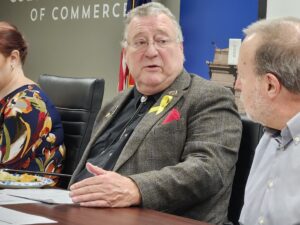
Colorado state Rep. Marc Snyder speaks to the Colorado Chamber of Commerce Tax Council on Feb. 2.
Snyder is one of two members of his caucus (with Rep. Shannon Bird) offering a frequent “no” vote on business-opposed legislation ranging from a single-payer health-care study to increased workplace regulations to expansion of deceptive-trade-practices lawsuits. But Snyder also has supported several successful environmental regulations that business leaders argue are raising the costs of living and housing, and he backed both labor bills that Polis eventually vetoed this year.
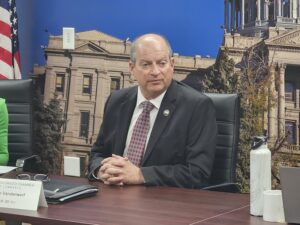
Stan VanderWerf speaks at a Colorado Chamber of Commerce event.
VanderWerf points to his history of working with Democrats on issues like El Paso County redistricting, and he has served on bipartisan committees like the Colorado Board of Health. His priorities include reduction of regulatory burdens, increased transportation funding and greater focus on economic development.
Senate District 13 (Weld and Adams counties from Evans south to Brighton)
This district that leans Republican could flip for the second time in just over two years, after former GOP Sen. Kevin Priola of Henderson switched parties just before the 2022 election, adding to the Democrats’ landslide that year. Priola is term-limited, leaving an open-seat battle between Republican child-care business owner Scott Bright and Brighton City Councilman Matt Johnston, a Democrat, that arguably represents Republicans’ best chance to flip a Democratic Senate seat.

Scott Bright speaks at a Colorado Chamber of Commerce event.
Bright’s core tenet is to limit the reach of government — by imposing a regulatory moratorium, by rolling back insurance mandates like the Colorado Option and by ending preferential tax treatment for certain businesses. A major focus of his is energy, where he believes the state needs to let transitions to hydrogen power or electric vehicles proceed without mandates and recognize that natural gas is the most efficient way to heat homes.
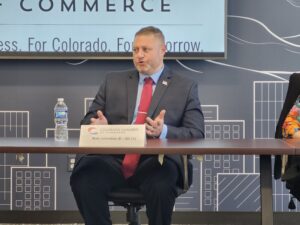
Matt Johnston speaks at a Colorado Chamber of Commerce event.
Johnston is a former Republican and one-time coal-mine worker who expects to buck his party at times on issues like energy by ensuring that the transition to renewables does not proceed too quickly. But he also is a staunch advocate for organized labor who expects to back his party’s efforts in that area.
Senate District 16 (Parts of Centennial, Littleton and southeast Jefferson County)
Democratic Sen. Chris Kolker flipped a Republican Senate seat four years ago by a 10-point margin, but the district traditionally has been tighter than those results indicate. This year, Centennial City Councilwoman Robyn Carnes, a Republican, is challenging him and is garnering increasing attention by running what she dubs a “purple race” in a swing district.
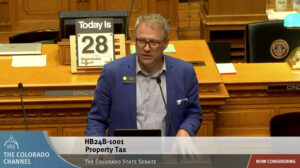
Colorado state Sen. Chris Kolker speaks on the Senate floor during the 2024 special session.
Kolker has a mixed record on business bills. He co-sponsored two bills in 2021 and 2022 that changed state law to allow LLCs and S Corps to take advantage of significant federal tax breaks that previously were unavailable to them, as well as a bill to lower business-registration fees for new companies. But he’s also sponsored legislation that could have limited use of metro districts to build new homes and was one of the most vocal opponents this year on a bill to institute further construction-defects reform.

Robyn Carnes speaks at a Colorado Chamber of Commerce event.
Carnes, who argues that SD 16 got more Republican in redistricting, supports reform that can lead to more condominium construction and a general lessening of regulations on businesses. And much like the Senate Republicans hoping to fend off superminority status, she is emphasizing the need for balance in the upper chamber.










